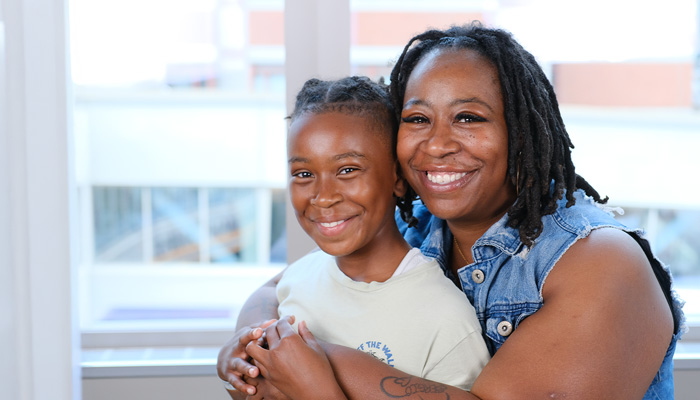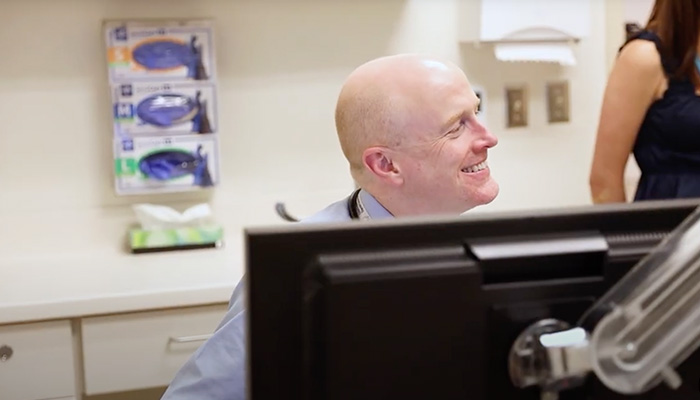HOW CAN WE HELP YOU? Call 1-800-TRY-CHOP
In This Section
Meet Kyrie: A CHOP Research Hero Helping to Advance Cancer Care

Kyrie, 10, and his mother, Shantyl Woodberry, stayed positive while Kyrie underwent treatment for a rare cancer at Children’s Hospital of Philadelphia.
Kyrie is a typical 10-year-old in many ways — he loves swimming, drawing, and cheering for the Philadelphia Eagles. In other ways, his childhood has been far from normal.
In December 2021, when he was 6 years old, Kyrie started experiencing stomach pain and was referred to Children's Hospital of Philadelphia. At CHOP, genetic testing revealed that Kyrie had a soft tissue sarcoma with a rare mutation, called a neurotrophic tyrosine receptor kinase (NTRK) gene fusion.
While chemotherapy is standard care to treat this kind of tumor, the drugs come with both short- and long-term side effects, including potential harm to a child's developing organs and tissues.
Kyrie's medical team offered another option: He could forgo chemotherapy and participate in a clinical trial. The study would test the effectiveness of a twice-daily, oral medication with low side effects, called larotrectinib, in stopping tumor growth.
"This is an example of how we can move precision medicine discoveries to the frontline of care, in order to spare patients from therapies that are more toxic and less effective," said oncologist Theodore Laetsch, MD, who led one of the initial clinical trials for larotrectinib and now serves as principal investigator of the Center for Precision Medicine for High-risk Pediatric Cancer — a CHOP Frontier Program.
Kyrie completed treatment with larotrectinib in December 2023 and has remained cancer-free. He and his mother, Shantyl Woodberry, now want to serve as advocates for other families who have the opportunity to participate in clinical research.
"My initial thought was, 'If this is going to help other people, then let's do it,'" Woodberry said. "Why not be the example? Why not be the person who could be the change for somebody else? It wasn't even a question."
A Precision Medicine Milestone
Meet Kyrie: A CHOP Research Hero. Access the video transcript
The U.S. Food and Drug Administration approved larotrectinib (Vitrakvi®, Bayer) in 2018 for a wide range of cancers that share a genetic mutation — an NTRK gene fusion — rather than a tumor's location in the body. By tailoring medical treatment to the specific vulnerabilities in an individual's tumor, the drug approval represented a milestone for precision medicine.
"We discovered that there's a very specific targeted therapy that can block the genetic change present in this tumor," Dr. Laetsch said. "And it's really shown a remarkable progress for patients with this disease."
While larotrectinib's approval offered a new option for patients and their families, the medication was initially only approved to treat children who had already undergone chemotherapy or lacked an acceptable standard-of-care therapy.
Confident in larotrectinib's potential as a frontline therapy, researchers at CHOP and the Children's Oncology Group launched the ADVL1823 clinical trial in 2019. They enrolled 33 pediatric patients with newly diagnosed cancers into the trial, who received larotrectinib twice daily for six- to 26-month cycles.
Ninety-four percent of patients with soft tissue sarcoma and 60% with other solid tumors responded to the therapy within six cycles. Two patients experienced disease progression while on the therapy and eventually died of their disease. Sixteen patients, including Kyrie, underwent surgery to remove their tumor, and experienced prolonged event-free survival. The researchers' findings were published in the Journal of Clinical Oncology in 2024.
Kyrie's Story

Oncologist Theodore Laetsch, MD, led one of the initial clinical trials for larotrectinib and now serves as principal investigator of the Center for Precision Medicine for High-risk Pediatric Cancer at CHOP.
Kyrie's medical journey began when he was sent home from school in 2021 with intense stomach pain.
"My stomach was hurting a lot," he said. "I stayed home for a couple of days."
Days later, he could barely stand. Woodberry brought Kyrie to CHOP, where he was diagnosed with a an NTRK fusion–positive soft tissue sarcoma.
Kyrie enrolled into the ADVL1823 trial and was treated with larotrectinib for six months before undergoing surgery to remove the tumor in his abdomen.
Throughout the process, Kyrie and Woodberry remained positive, creating videos from the hospital to share his progress with friends and family on social media.
"It was an experience that is going to help so many more children," Woodberry said. "CHOP was like the other parent, holding my hand and helping me through it."
Dr. Laetsch said that clinical trials and willing participants like Kyrie are essential for the future of treating children with cancer.
"Fifty years ago, almost all children with cancer died. Today, more than 80% of children with cancer are cured — due to clinical research and clinical trials that have enabled us to advance the field," Dr. Laetsch said.
Kyrie also has a message for any children going through a similar cancer experience:
"Just stay strong," he said, "and be brave."


